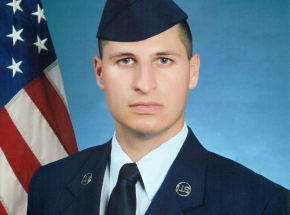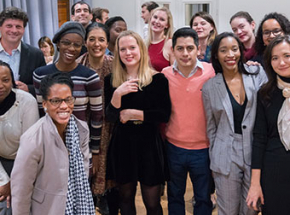- About AUP
- History of AUP
- Mission & Core Values
- Vision and Leadership
- AUP Recognition
- Alumni Success
- Campus Development
- Arts at AUP
- Policies & Guidelines
- Academics
- Undergraduate
- Graduate Programs
- MA in Diplomacy and International Law
- MA in Global Communications
- MSc in Human Rights and Data Science
- MA in International Affairs
- MA in International Affairs, Conflict Resolution, and Civil Society Development
- MSc in International Management
- MSc in Strategic Brand Management
- Find Your Thesis Advisor
- Previous Programs
- Cultural Program
- Faculty
- Summer School
- Research Centers
- The Center for Critical Democracy Studies
- The Center for Writers and Translators
- The George and Irina Schaeffer Center for the Study of Genocide, Human Rights and Conflict Prevention
- The Joy and Edward Frieman Environmental Science Center
- The Center for Media, Communication & Global Change
- Departments
- Academic Resources
- Academic Affairs
- Academic Calendar
- Academic Resource Center
- Library
- Registrar's Office
- Teaching and Learning Center
- Employer Network
- Accessibility & Accommodation Services
- Quai D'Orsay Learning Commons
- Paris as Classroom
- ACE Center
- Admissions
- Student Life
- Campus
- Get Involved
- Paris
- Support Services
- Student Development Help Desk
- Student Accounting Services
- Student Immigration Services
- Student Grievance Procedure
- Accessibility at AUP
- Diversity and Inclusion
- Health & Well-being
- Digital Student Handbook
- News
- Events
- AUP Giving
- Housing Offer for 2024-2025
- Housing | Spring 2024
- IRIS Project
- IT Services
- Alumni
- About AUP
- History of AUP
- Mission & Core Values
- Vision and Leadership
- AUP Recognition
- Alumni Success
- Campus Development
- Arts at AUP
- Policies & Guidelines
- Academics
- Undergraduate
- Graduate Programs
- MA in Diplomacy and International Law
- MA in Global Communications
- MSc in Human Rights and Data Science
- MA in International Affairs
- MA in International Affairs, Conflict Resolution, and Civil Society Development
- MSc in International Management
- MSc in Strategic Brand Management
- Find Your Thesis Advisor
- Previous Programs
- Cultural Program
- Faculty
- Summer School
- Research Centers
- The Center for Critical Democracy Studies
- The Center for Writers and Translators
- The George and Irina Schaeffer Center for the Study of Genocide, Human Rights and Conflict Prevention
- The Joy and Edward Frieman Environmental Science Center
- The Center for Media, Communication & Global Change
- Departments
- Academic Resources
- Academic Affairs
- Academic Calendar
- Academic Resource Center
- Library
- Registrar's Office
- Teaching and Learning Center
- Employer Network
- Accessibility & Accommodation Services
- Quai D'Orsay Learning Commons
- Paris as Classroom
- ACE Center
- Admissions
- Student Life
- Campus
- Get Involved
- Paris
- Support Services
- Health & Well-being
- Digital Student Handbook
- News
- Events
- AUP Giving
- Housing Offer for 2024-2025
- Housing | Spring 2024
- IRIS Project
- IT Services
- Alumni
Related Links
Graduate Thesis
Faith Toran
MA Global Communications (Development track)
Related Graduate Programs :
Thesis title: Participatory Rural Appraisal: A 21st Century Reappraisal – A Case Study of Participatory Development Practices in Waste Management: The kNOw PLASTICS Educational Programme
I studied full time for an MA in Global Communications, opting to take the Development Communications Track – in fact, along with the Sustainable Development Practicum in Auroville, India, the option to specialize was what prompted me to apply to AUP. My interest in development was fueled by two years and three months working as a Peace Corps volunteer in Burkina Faso, West Africa, where I advocated for participatory development; when projects faced challenges, I hypothesized that problems usually arose due to a lack of participation.
Participatory communication is widely used and advocated for in the 21st-century development agenda. My thesis focuses on a contemporary reappraisal of the participatory turn in development practices, and, in particular, the Participatory Rural Appraisal (PRA) method popularized in the 1990s. PRA aims to incorporate the views of rural local people in the creation, implementation and evaluation of development programs. When studying development communications literature, I noticed a marked shift in discourse over the last few decades from modernization frameworks to participatory paradigms within development theory. I wanted to explore the theoretical and practical realities of this move toward participation.
The objective of my thesis was to explore the emergence of PRA, to examine how it has been conceived theoretically in development literature, and to take stock of its many field methods and practices. The thesis mostly analyzed PRA at a micro level by focusing on individual communities, but it took into consideration the fact that development also takes place at the macro level within national governments and global institutions. I conducted an inventory of best practices for using PRA, in order to explore possibilities for expanding effective development communication methods.
There has, historically, been a lack of research into the relevance of PRA in waste management projects. I therefore presented field research, undertaken over six months in Auroville, relating to a waste-management educational program designed around the concept of “participatory methods for social justice.” My case study focused on PRA frameworks operating within the nongovernmental organization WasteLess, which focuses on waste reduction programs, and, in particular, within its kNOw PLASTICS educational program in Auroville. The program aims, via an experiential learning initiative, to empower children to be involved in reducing plastic pollution. I used a combination of participant observation, discourse analysis, thematic analysis and in-depth interviews to analyze PRA practices in the program.
My findings indicated that the kNOw PLASTICS program included evidence of participatory communications, including encouraging collaboration, giving participants a voice, sharing information, encouraging dialogue and undertaking consultations with participants. However, the project did not reflect aspects of empowerment participation, which would have required participants to also engage in the initial creation and later evaluation of the program. Empowerment participation needs to offer a means of addressing structural inequalities among marginalized groups.
The key takeaway from this research is the importance of participatory frameworks to a project’s lifecycle. Participation, both in how it is conceived theoretically and how it is applied to the project, remains a core methodological value for the WasteLess team. The kNOw PLASTICS educational program is, therefore, a participatory project, but in order to continue to progress and to meet the objectives of empowerment participation (and thus behavior change), participation must be continuously assessed, evaluated, documented and expanded to meet different social, political, economic and cultural contexts.
One of the drawbacks of the kNOw PLASTICS educational program was that there was a lack of data evaluating its participatory elements – something that could have been restricting its expansion. My thesis provided data, which can be expanded upon in the future, for evaluating the participatory components of the project. It is important for NGOs that use participatory components in their projects to be aware of how they conceive of and apply these frameworks. They also need to be flexible to allow for these methods to expand beyond a project’s scope, if the ultimate aim is participant empowerment.
I believe that PRA is a valuable development tool to facilitate empowerment and move toward “good” development. While conducting my field study in India, and thanks to my critical reflections in the process of writing my thesis, I evolved a deeper understanding of the theoretical and practical constraints of a participatory paradigm. It is important to be concerned with what “participatory” means, both conceptually and in its application to NGO projects. I now plan to conduct PhD research that builds on my master’s thesis, in which I would focus on assessing behavior change in climate action initiatives.
Related
-

Jason
Student
Read MoreJason
Student
After studying with such a global population, it's made me much more conscious of life outside my own understanding.
-

Pass the Tech
Featured Course
Read MorePass the Tech
Featured Course
Mobilising alumni, students and faculty to be part of the solution
-

Alexandra Swies G'14
Alumna
Read MoreAlexandra Swies G'14
Alumna
Fashion has always been a passion of mine, but AUP has the perfect program to turn my passion into a career.

